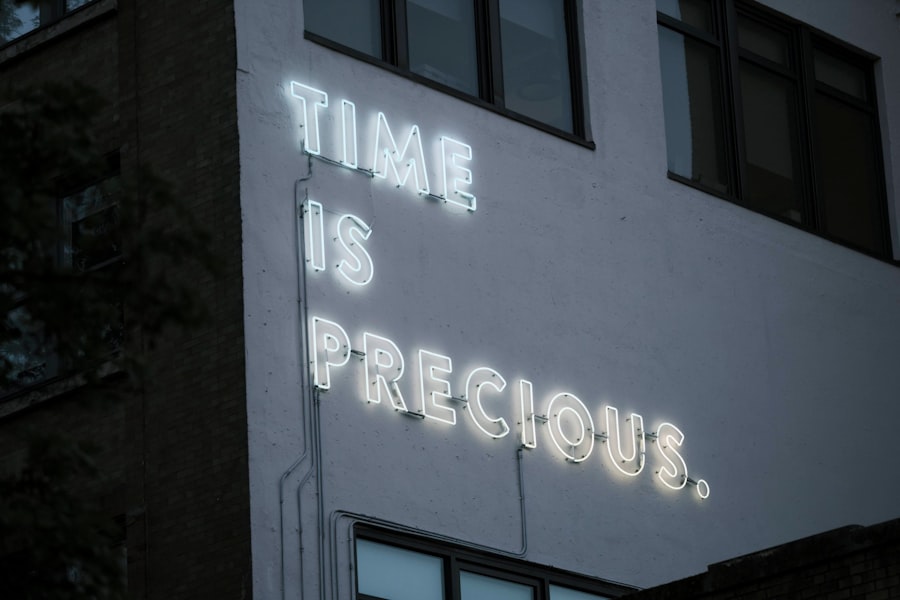Time perception is a fascinating area of study that delves into how you experience the passage of time. It is not merely a function of clocks and calendars; rather, it is a complex interplay of cognitive processes that shape your understanding of temporal events. Scientists have long been intrigued by the subjective nature of time, which can seem to stretch or contract based on various factors.
For instance, you may have noticed that time feels like it flies when you are having fun, yet drags on during tedious tasks. This phenomenon raises questions about the underlying mechanisms that govern your perception of time. At its core, time perception involves a series of neural processes that allow you to interpret and respond to temporal information.
Researchers have identified specific brain regions, such as the suprachiasmatic nucleus and the prefrontal cortex, that play crucial roles in how you perceive time. These areas work together to create a cohesive understanding of past, present, and future events. The science of time perception is not just an academic pursuit; it has real-world implications for how you navigate your daily life and make decisions.
Key Takeaways
- Time perception is influenced by a combination of internal and external factors, including attention, memory, and emotions.
- The brain processes time through a complex network of neural pathways, involving the prefrontal cortex, basal ganglia, and cerebellum.
- Emotions play a significant role in shaping our perception of time, with positive emotions leading to an overestimation of time and negative emotions leading to an underestimation.
- Cultural differences can impact how individuals perceive and value time, with some cultures placing a greater emphasis on punctuality and efficiency than others.
- As individuals age, their perception of time may change, with older adults often perceiving time as passing more quickly than younger individuals.
How the Brain Processes Time
Your brain processes time through a combination of sensory input and cognitive evaluation. When you engage with the world around you, your brain continuously receives signals about the timing of events. For example, when you hear a song, your brain decodes the rhythm and tempo, allowing you to anticipate when the next beat will occur.
This ability to predict timing is essential for various activities, from playing music to participating in sports. The brain’s internal clock helps you synchronize your actions with external stimuli, creating a seamless experience of time. Moreover, the brain’s processing of time is not uniform; it can vary significantly based on context and individual differences.
Some studies suggest that your perception of time can be influenced by attention and focus. When you concentrate on a task, your brain may allocate more resources to processing temporal information, making time feel like it is passing more quickly. Conversely, distractions can lead to a distorted sense of time, causing it to feel as though it is dragging on.
Understanding these mechanisms can help you harness your cognitive abilities to enhance your experience of time.
Factors that Influence Time Perception

Several factors can influence how you perceive time, ranging from environmental cues to personal experiences. One significant factor is age; as you grow older, your perception of time often changes. Children tend to experience time more slowly than adults, which may be attributed to their novel experiences and the way they process information.
As you accumulate more experiences, time may seem to accelerate, leading to the common adage that “time flies as you get older.” This shift in perception can impact how you plan and prioritize your activities. Another critical factor is the nature of the activity you are engaged in. Engaging in new or challenging experiences can make time feel elongated, while routine tasks may cause it to feel compressed.
For instance, if you embark on a thrilling adventure or learn a new skill, you may find that those moments linger in your memory, creating a sense of timelessness. Conversely, monotonous activities can lead to a feeling of time slipping away unnoticed. By recognizing these influences, you can make conscious choices about how to structure your time for a more fulfilling experience.
The Role of Emotions in Time Perception
| Emotion | Time Perception |
|---|---|
| Happiness | Time seems to pass more quickly |
| Fear | Time appears to slow down |
| Anger | Time feels longer |
| Sadness | Time may seem to drag on |
Emotions play a pivotal role in shaping your perception of time. When you experience heightened emotions—whether joy, fear, or sadness—your brain processes temporal information differently than during neutral states. For example, during moments of fear or anxiety, time may seem to slow down as your body prepares for a fight-or-flight response.
This phenomenon can be attributed to increased attention and heightened awareness of your surroundings, allowing you to react more effectively in critical situations. Conversely, positive emotions can create a sense of timelessness. When you are immersed in joy or excitement, your perception of time may become distorted, leading you to feel as though hours have passed in mere minutes.
This emotional connection to time can significantly impact how you remember experiences; joyful moments are often recalled with vivid detail, while mundane times may fade into obscurity. By understanding the interplay between emotions and time perception, you can cultivate experiences that enhance your emotional well-being.
Cultural Differences in Time Perception
Cultural background significantly influences how you perceive and value time. Different cultures have varying attitudes toward punctuality, scheduling, and the importance of time management. In some cultures, such as those in Western societies, there is a strong emphasis on efficiency and strict adherence to schedules.
You may find that being late is frowned upon and that time is viewed as a finite resource to be managed carefully. In contrast, other cultures may adopt a more fluid approach to time. In many Latin American and Mediterranean cultures, for example, relationships and social interactions often take precedence over strict adherence to schedules.
This cultural perspective allows for a more relaxed interpretation of time, where being late may be acceptable if it means fostering connections with others. Understanding these cultural differences can enhance your interactions with people from diverse backgrounds and help you navigate social situations more effectively.
Time Perception and Aging

As you age, your perception of time undergoes notable changes that can affect various aspects of your life. Research suggests that older adults often perceive time as passing more quickly than younger individuals do. This phenomenon may be linked to the accumulation of experiences; as you age and encounter fewer novel situations, each day may blend into the next, creating a sense of rapid passage.
Additionally, aging can impact how you prioritize activities and manage your time. With increased responsibilities and commitments often accompanying adulthood, you may find yourself juggling multiple tasks simultaneously. This busy lifestyle can contribute to a feeling that time is slipping away faster than ever before.
By recognizing these changes in your perception of time as you age, you can make intentional choices about how to spend your days and create meaningful experiences.
Time Perception and Mental Health
Your mental health can significantly influence how you perceive time. Conditions such as anxiety and depression often distort temporal perception, leading to feelings of hopelessness or urgency. For instance, individuals with anxiety may experience time as dragging on during moments of distress, while those with depression might feel as though days blend together without distinction.
Conversely, positive mental health can enhance your experience of time. When you are engaged in activities that bring you joy or fulfillment, your perception of time may shift toward a more expansive view. Mindfulness practices have been shown to improve mental well-being by encouraging present-moment awareness and reducing rumination about the past or future.
By prioritizing mental health and well-being, you can cultivate a healthier relationship with time.
The Illusion of Time
The concept of the illusion of time challenges our conventional understanding of temporal reality. While clocks measure seconds and minutes with precision, your subjective experience of time can be remarkably fluid and malleable. This illusion becomes particularly evident during moments of intense focus or distraction; when fully immersed in an activity, hours may pass without notice.
Philosophers and scientists alike have pondered the nature of time for centuries. Some argue that time is an illusion created by human consciousness—a construct that helps you make sense of experiences but does not exist independently in the universe. This perspective invites deeper contemplation about how you perceive reality and the role that consciousness plays in shaping your understanding of existence.
Techniques for Altering Time Perception
There are various techniques you can employ to alter your perception of time intentionally. Mindfulness practices are among the most effective methods for enhancing present-moment awareness and expanding your experience of time. By focusing on your breath or engaging in meditation, you can cultivate a sense of timelessness that allows you to savor each moment fully.
Another technique involves engaging in new experiences or challenges that push you out of your comfort zone.
Whether it’s traveling to a new destination or trying a new hobby, embracing change can create lasting memories and alter how you perceive the passage of time.
Practical Applications of Understanding Time Perception
Understanding time perception has practical applications across various fields, from education to therapy and beyond. In educational settings, recognizing how students perceive time can inform teaching strategies that enhance engagement and learning outcomes. For instance, incorporating interactive activities or hands-on experiences can help students feel more connected to the material and improve their retention.
In therapeutic contexts, understanding how clients perceive time can guide interventions aimed at improving mental health outcomes. Therapists may use techniques that encourage mindfulness or challenge distorted perceptions related to anxiety or depression. By addressing these perceptions directly, individuals can develop healthier relationships with their experiences and cultivate a greater sense of agency over their lives.
The Future of Time Perception Research
The field of time perception research continues to evolve as scientists explore new frontiers in understanding this complex phenomenon. Advances in neuroimaging technology allow researchers to investigate the neural mechanisms underlying temporal processing with greater precision than ever before. As our understanding deepens, we may uncover new insights into how various factors—such as culture, emotion, and mental health—interact with our perception of time.
Future research may also explore practical applications for enhancing well-being through improved time perception strategies. As society grapples with issues related to stress and mental health in an increasingly fast-paced world, understanding how to manipulate our experience of time could offer valuable tools for fostering resilience and fulfillment in daily life. In conclusion, the science of time perception encompasses a rich tapestry of cognitive processes influenced by various factors such as emotions, culture, aging, and mental health.
By exploring these dimensions further, we can gain valuable insights into our relationship with time and harness this knowledge for personal growth and well-being.
Time perception is a fascinating aspect of human psychology that delves into how individuals experience the passage of time, which can vary significantly based on various factors such as attention, emotion, and even age. For those interested in exploring this topic further, a related article can be found on Unplugged Psych. This article provides insights into the psychological mechanisms behind time perception and how it influences our daily lives. You can read more about it by visiting Unplugged Psych.
WATCH THIS! Is This Hidden ADHD Sign Quietly Wrecking Your Sleep and Draining Your Energy?
FAQs
What is time perception?
Time perception refers to the subjective experience of time, including the perception of the passage of time, the estimation of time intervals, and the ability to accurately judge the duration of events.
How does time perception work?
Time perception is influenced by various factors, including attention, arousal, memory, and the brain’s internal clock. It is also influenced by external factors such as the environment and social context.
What factors can affect time perception?
Factors that can affect time perception include age, emotions, cognitive load, attentional focus, and the presence of distractions. Cultural differences and individual differences in personality and cognitive abilities can also impact time perception.
Can time perception be altered?
Yes, time perception can be altered through various means, such as meditation, mindfulness practices, and certain drugs. Additionally, psychological conditions such as anxiety and depression can also alter time perception.
Why is time perception important?
Time perception plays a crucial role in various aspects of human behavior and cognition, including decision-making, motor control, and the ability to navigate and interact with the environment. Understanding time perception is also important in fields such as psychology, neuroscience, and human-computer interaction.




